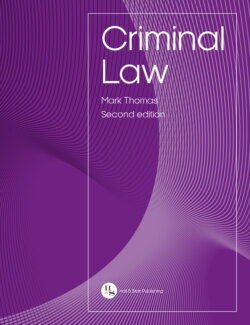Читать книгу Criminal Law - Mark Thomas - Страница 42
На сайте Литреса книга снята с продажи.
1.7.2.1 Principles of evidence
ОглавлениеThe rules of evidence are predicated on a number of core principles that apply to most forms of evidence. These core principles are detailed in Table 1.4.
Table 1.4Core principles of evidence
| Core principle | Explanation |
| Admissibility | The admissibility of evidence is a matter for the arbiter of law, ie the judge or magistrates. In R v Terry [1996] 2 SCR 207 (Canada) it was held that evidence will be admissible if: (a)it is relevant; (b)such that a jury, properly warned about any defects it might have, could place some weight on it; and (c)it is not excluded by any rule of law. |
| Relevance | The relevance of evidence is also a matter to be determined by the arbiter of law. According to Lord Simon in DPP v Kilbourne [1973] AC 729, evidence is relevant if ‘it is logically probative or disprobative of some matter which requires proof’. This essentially means that if the evidence goes to prove or disprove a particular matter in issue between the parties, it is considered as being relevant. |
| Weight | The weight of the evidence is a matter for the arbiters of fact; it is their role to determine how much weight they wish to afford to a particular piece of evidence. Like relevance, weight is a question of degree and ultimately depends on how the arbiters of fact view the usefulness of the evidence. At one end of the spectrum, the evidence may be of little probative value, being so weak that it is described as ‘insufficient evidence’, whereas, at the other end, it may be virtually conclusive of the facts in issue that it is described as ‘prima facie evidence’. |
The use of these principles ultimately depends upon the matter which is sought to be proven/disproven. In this respect, there are two matters that are relevant to the law of evidence:
(a) Facts in issue: These are the facts that are at the centre of a criminal trial and refer to the issue being contested between the parties. In a crime where the defendant pleads not guilty on account that he did not commit the offence, every element of that offence therefore becomes a fact in issue – ie whether the defendant committed each element is in contention. In a similar vein, where a defendant pleads not guilty on account of one element of an offence (eg that a complainant did consent to sexual intercourse), then the only fact in issue relevant to this case is whether the complainant consented or not. Every other issue, ie whether there has been an act of sexual intercourse, is therefore irrelevant.
(b)Collateral facts: These are facts that do not form part of the facts in issue. These facts are relevant in terms of the reliability of witnesses and the evidence produced. Counsel will often cross-examine a witness regarding their evidence in an attempt to discredit them, eg by suggesting that they are mistaken or, potentially, lying.
